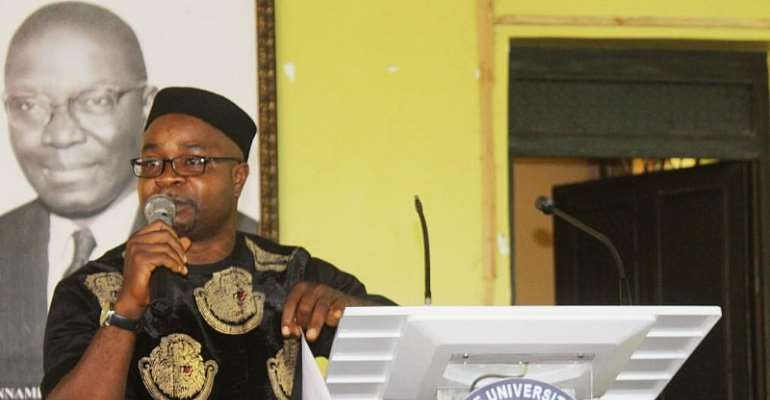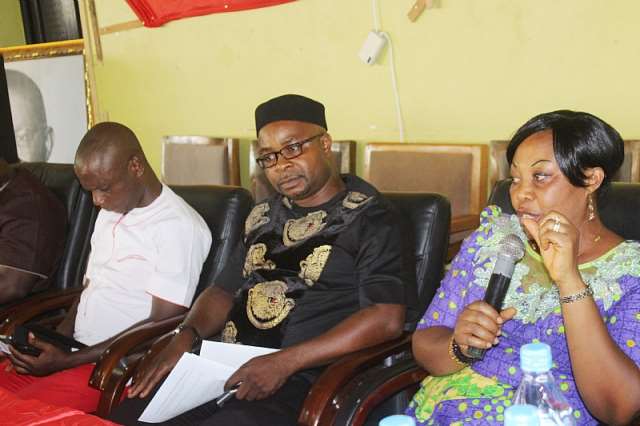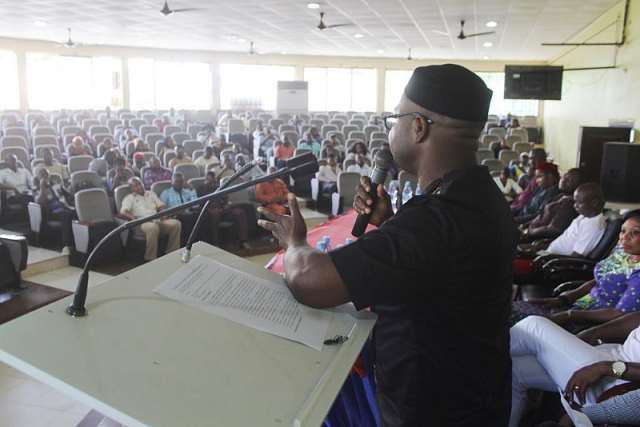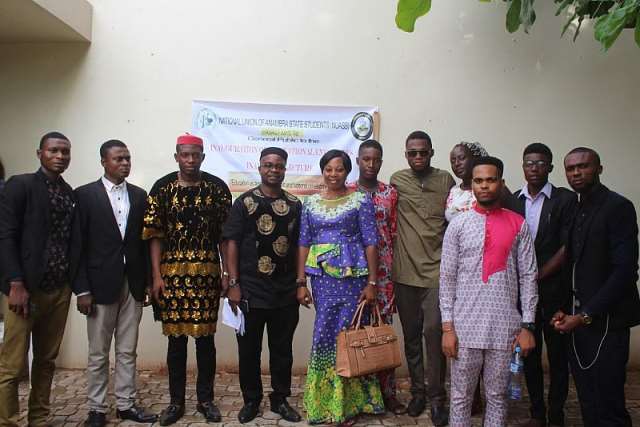Eze Makes Case For Knowledge Economy, Applauds Anambra For Blazing Trail

As Nigeria continues to reel from the shocks of falling oil prices in the international market, James Eze, a critical thinker and Senior Special Assistant to the Governor of Anambra State on Media has advised governments at all levels to reprioritize education with a view to helping the country make a swift transition to “knowledge economy.”
Delivering a lecture titled “Education as a Panacea for Self and National Development” at the formal inauguration of the National Executive of the National Union of Anambra State Students (NUASS) at NnamdiAzikiwe University at the weekend, Eze who is also a writer argued that if Nigeria must survive the endless vagaries of the international oil markets, there must be a strategic transition from a mono-economy to a Knowledge Economy.
Describing Knowledge Economy as an economy which shifts focus from the exploitation of natural resources and the exertion of physical strength on the means of production to creating, warehousing, perfecting and selling of information or knowledge, Eze argued that countries in North America and Europe would continue to lead the world because they had since made the transition to knowledge economy.
“The term knowledge economy was actually made popular by Peter Drukker who argued that there has been a paradigm shift from agricultural and labour-intensive economy to one that depends on knowledge and information. With the endless rise and fall in oil prices, Nigeria would do well to lay down the necessary foundations that will help her leapfrog to Knowledge Economy. This will de-emphasize our dependence on mineral resources and place our greatness in our own hands” he advised.
According to him, the first fundamental step to creating a knowledge economy is an immediate prioritization and re-focusing of education. “This will help us refocus attention from what lies beneath the soil to what lies between our ears. That is the future for humanity,” he argued.
Eze who is also a communications and Public Relations specialist further argued that the idea of the Tabula-Rasa as espoused by the early Greek philosophers which maintains that the human brain is a clean slate at birth that needs to be conditioned through learning and experience has made nonsense of any imperialist claim to intellectual superiority of some races over others. “Black Africa can join the digital race. We can contribute our quota to the exploding digital world order. However, we must get our educational fundamentals right,” he argued.
“I have no doubt that with better planning and sustained investment in education, research and development, Nigeria will sooner than latter make a smooth transition to a knowledge economy. We already have the beginnings of it here. The only difference is that we are not taking the signs seriously,” he maintained.
Blaming successive administrations for not having a sustained vision for education in the country, Eze observed that formal education took roots in Nigeria 1843 when the Methodist Church under Rev. Thomas Birch Freeman set up the first primary school in Badagry. He further noted that with the establishment of the first primary school, it took Nigeria 101 years to make its first attempt at educational planning which was done without clearly defined goals in 1944.
Posing some rhetorical questions, Eze asked, “How well has the nation’s educational sector evolved since the founding of the first primary school in Nigeria, 173 years ago?Have we become better planners of the educational sector 72 years after the first educational plan was hatched?”
Suggesting a way out for the country, Eze observed that Anambra State had since realized the imperatives of laying a good foundation for the society through education. “The first revolutionary step that Anambra State has taken was the return of mission schools to churches. Since education came to Nigeria through the missionaries, it goes without saying that they have a good grasp of how schools should be run,” he argued.
He also lauded the administration of Governor Willie Obiano for taking Nigeria’s first bold steps towards building its capacity for an eventual transition to a knowledge economy by sending 23 teachers from the state to Singapore for a special training. According to him, Obiano’s sustained investment in mission, public and private schools has turned Anambra into an exemplary state as Anambra children have twice represented Nigeria in World Schools Debate Championship, dazzling the world and coming home with laurels.
Concluding his presentation, Eze further averred that since it had become imperative for Nigeria to make a swift transition to Knowledge Economy, the country must without further delay, reposition education as top priority for governments at all levels and evolve a rolling plan for human capital development.
“Nigeria must also reposition Research and Development as the beacon for a greater future and go beyond the present symbolism of the Education Trust Fund to adopt a more pragmatic approach to funding education,” he advised.
Also giving his Inaugural Address, the National President of the National Union of Anambra State Students, Mr. Uzoma Ferdinand Ibekwe commended Governor Willie Obiano’s giant strides in education in Anambra State. “The youths are happy and Ndi Anambra students are grateful for the conducive atmosphere of learning and research which Governor Obiano has created in the state,” he observed.
The student’s leader also assured that “henceforth Anambra Students will be actively involved in the selection of political leaders, we must insist until the right things are done. We shall prove this in the coming election.”



